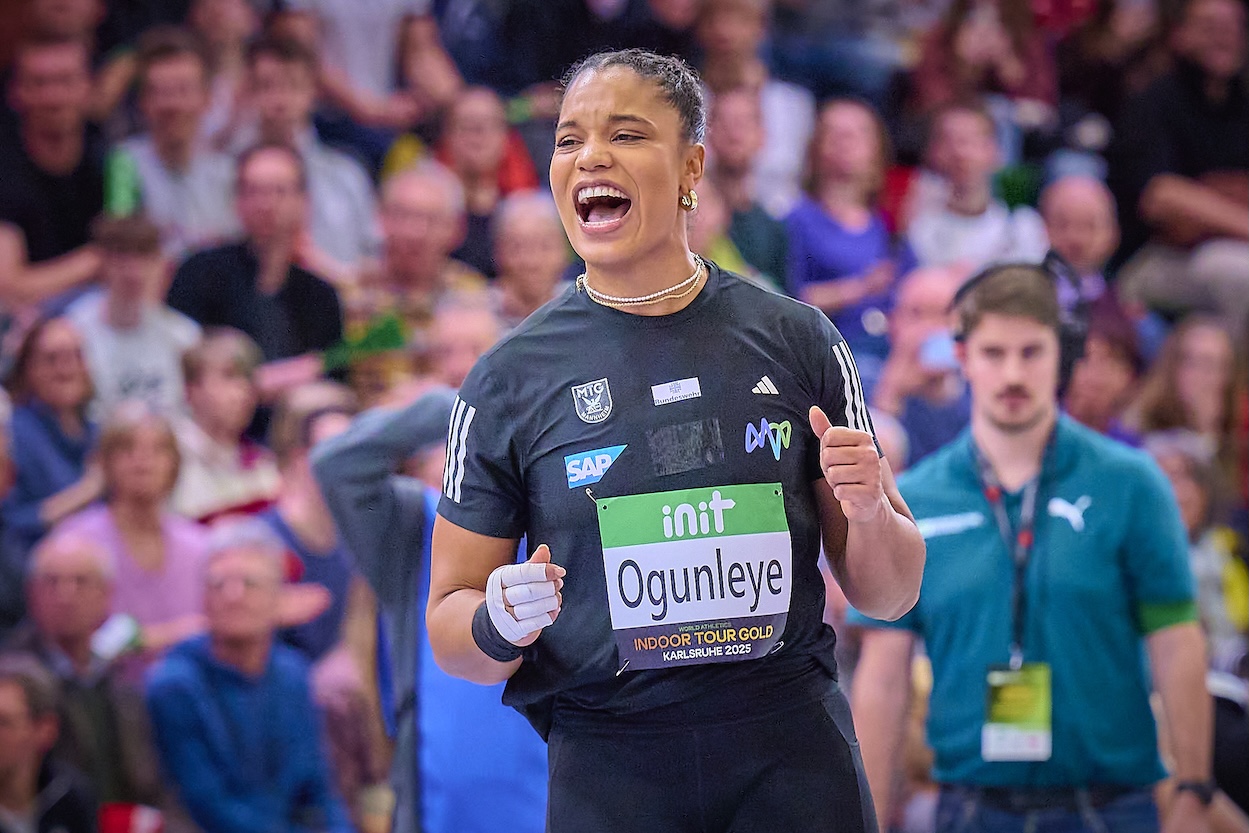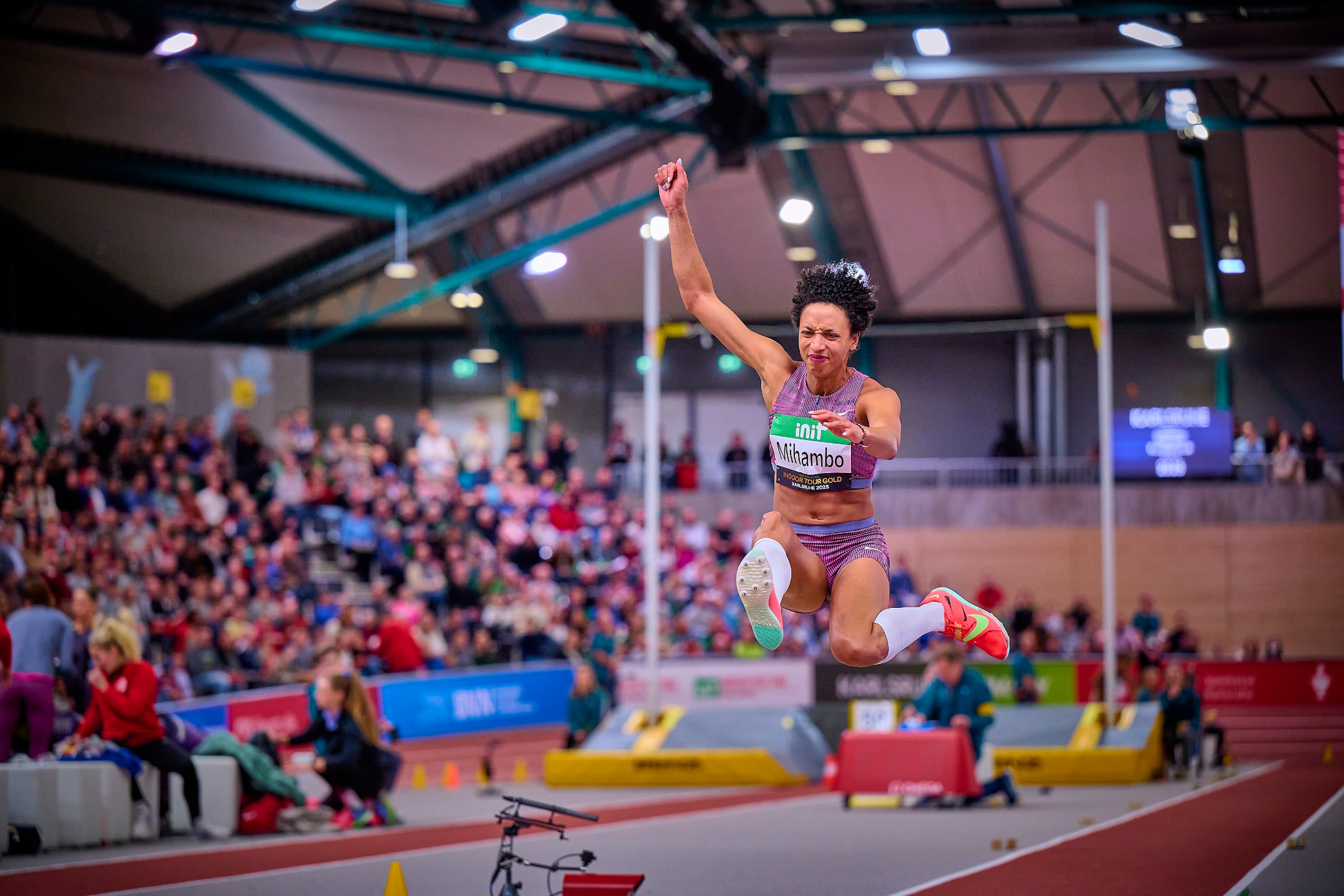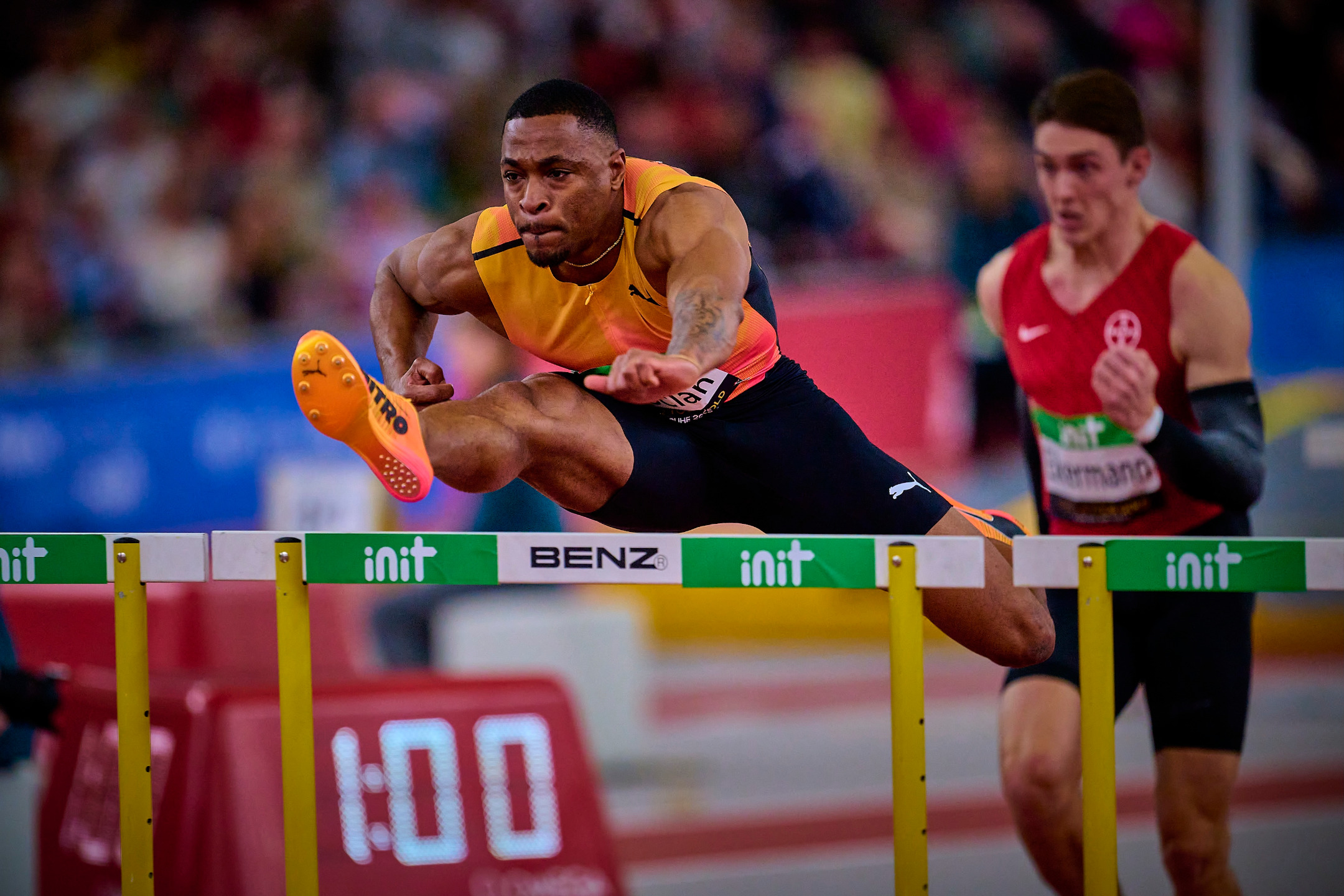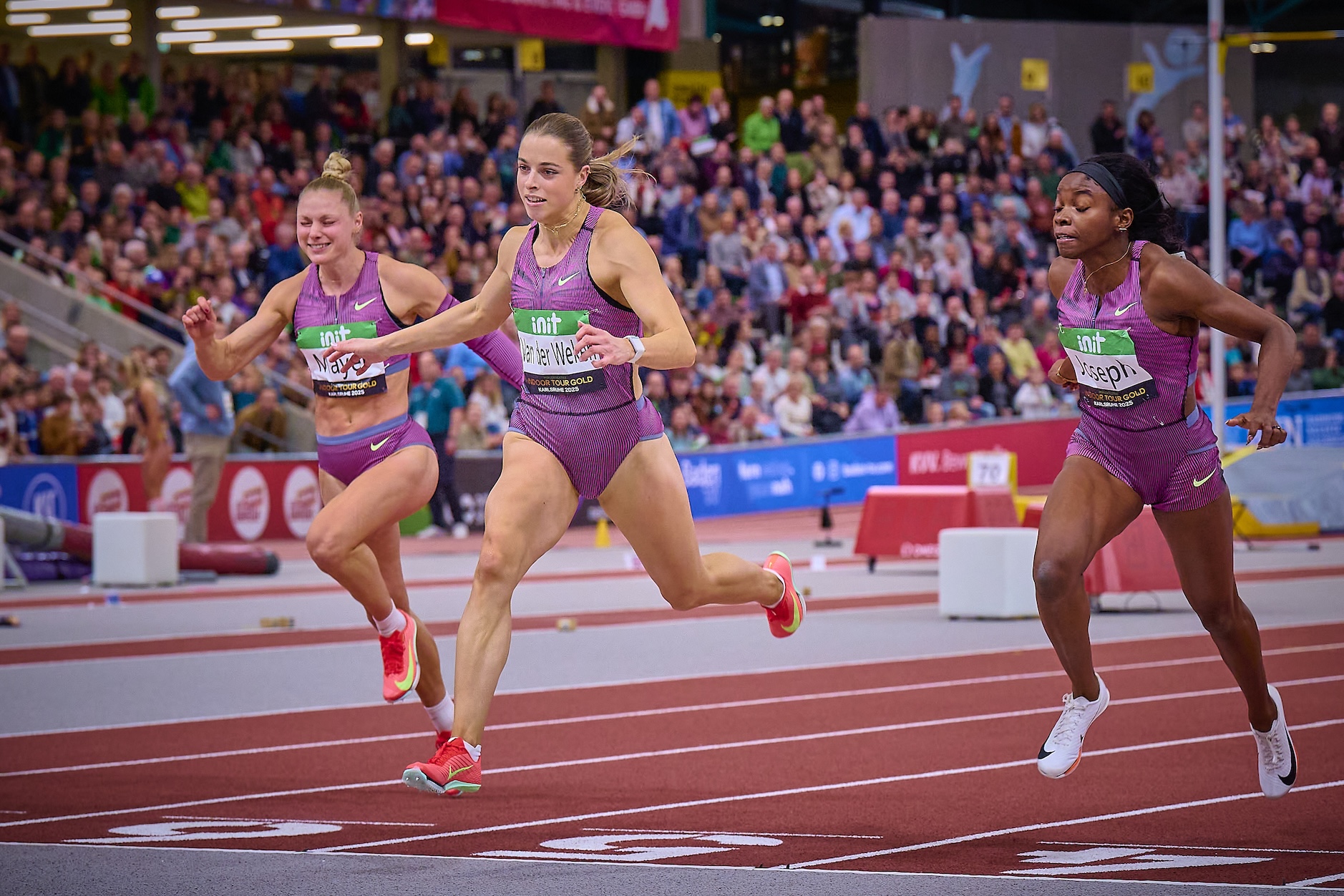Disciplines 2026
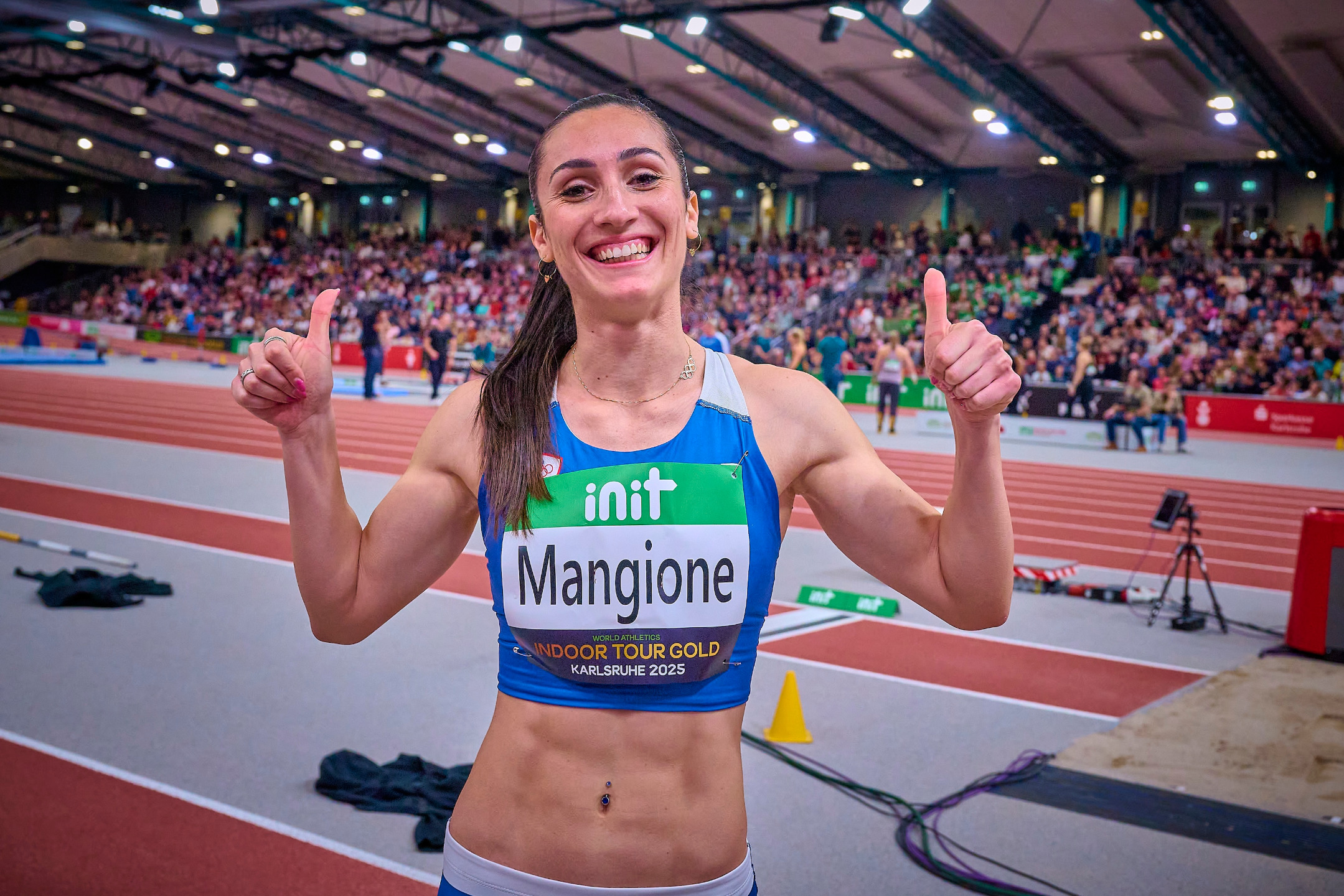
As part of the World Athletics Indoor Tour
A meeting record for the ages?
The 400 metres is one of the disciplines that was already included in the first edition of the INIT INDOOR MEETING in 1985, but it has always been only a brief interlude in the meeting calendar. This discipline was paused at the INIT INDOOR MEETING from 1991 to 2005. Helga Arendt has held the meeting record in this discipline since 1988. The runner from Eintracht Hamm completed the two laps of the stadium in an astonishing 50.84 seconds. No one has come close to this time so far, not even Italy's Alice Mangione last year. However, 51.75 seconds was enough for the day's victory and a national record on her return to the Europahalle in Karlsruhe.
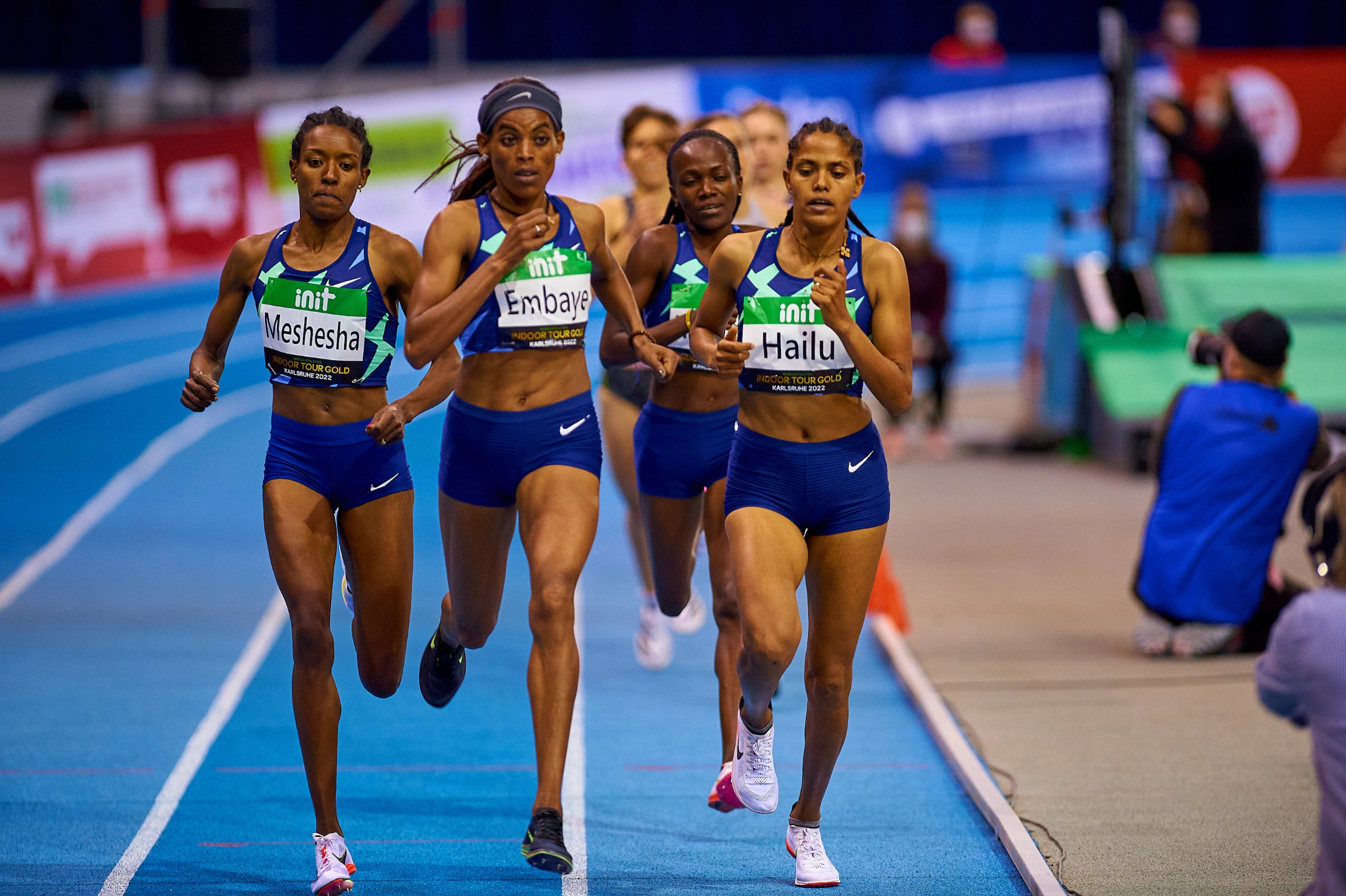
As part of the World Athletics Indoor Tour
From Szabo to Dibaba
The names of the women who have come out on top in the seven-and-a-half laps of the stadium at the INIT INDOOR MEETING Karlsruhe are among the best that athletics has had to offer in this middle distance event in the 40 years of the INIT INDOOR MEETING in Karlsruhe. One of the greats who competed at the Europahalle and was ultimately crowned the winner was Gabriela Szabo of Romania (1997). Szabo was particularly successful at the 1996 and 2000 Olympic Games. Theresia Kiesl from Austria (1996) and Violeta Szekely (1999), also from Romania, have also made it onto the meeting's list of winners. Lidia Chojecka from Poland has even won three times. In recent years, Ethiopian athletes have dominated the 1500 metres. Gelete Burka (2010) and Genzebe Dibaba (2012 and 2013) came close to breaking the meeting record of under four minutes, and so at the 2014 INDOOR MEETING, sports director Alain Blondel was certain that the meeting record would be broken this time. And he was right: in 3:55.17 minutes, Genzebe Dibaba not only smashed the meeting record but also beat Elena Soboleva's world record by more than three seconds. This meeting record still stands today. Genzebe Dibaba narrowly missed the record on 3 February 2018. With a time of 3:57.45 minutes, the Ethiopian secured the day's victory, relegating Germany's running sensation Konstanze Klosterhalfen (4:04.00 minutes) to second place. In 2020, the Ethiopian also won the women's 1,500 metres. In the most recent edition of the women's 1,500 metres in 2022, Ethiopian Axumawit Embaye won in a neck-and-neck race. In the end, she narrowly prevailed over her compatriot Hirut Meshesha (4:02.14 minutes) with a personal best of 4:02.12 minutes.
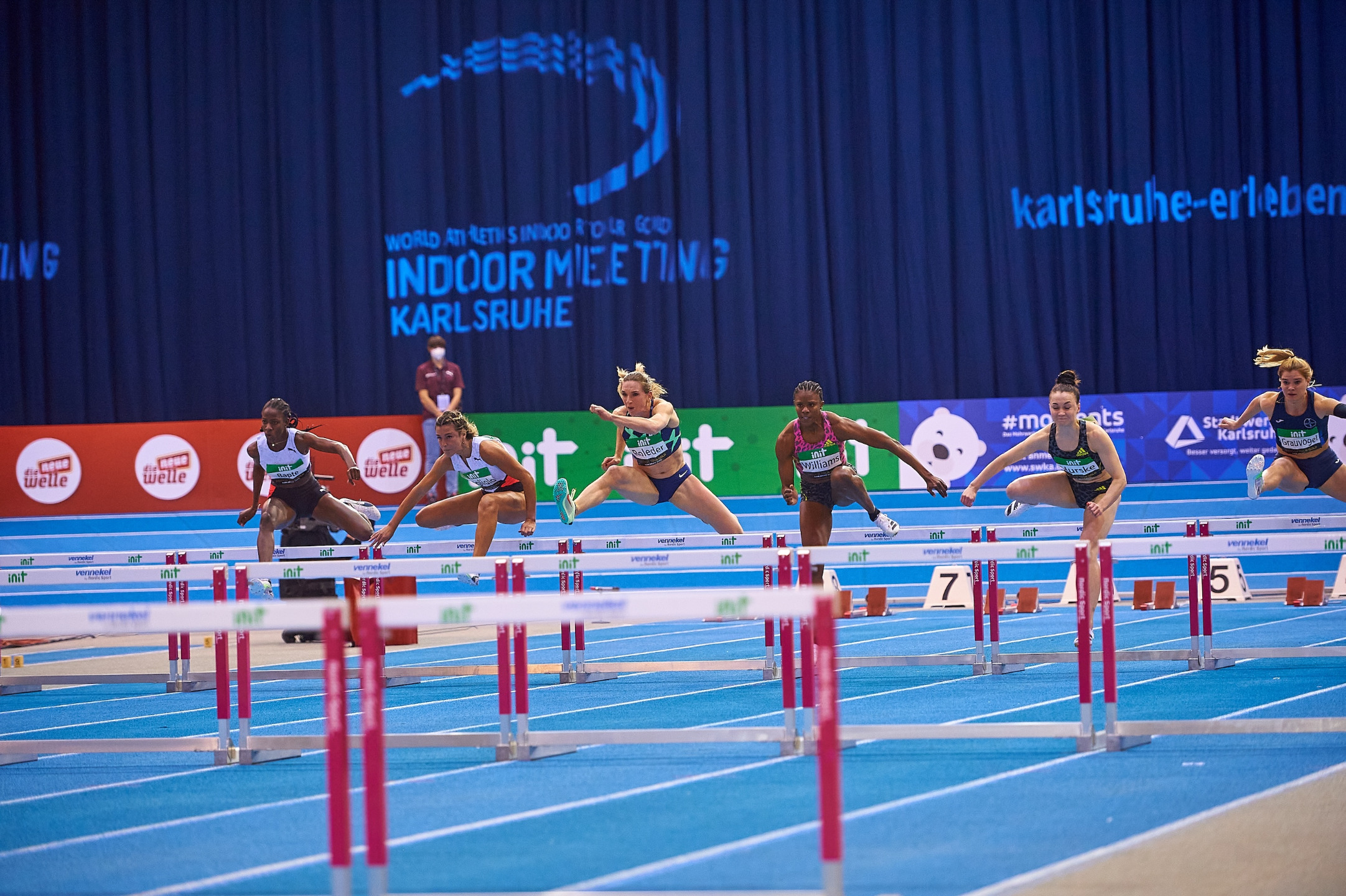
As part of the World Athletics Indoor Tour
Start number 768
When sports director Alain Blondel handed out the start numbers to the athletes at the INIT INDOOR MEETING on 10 February 2008, he gave Susanna Kallur the number 768 – a symbolic number. 7.68 (seconds) – that would have meant a world record, which had been held for 18 years by Kallur's compatriot Ludmila Engquist, who had achieved 7.69 seconds in Chelyabinsk in 1990 while still running for the Soviet Union. When Kallur stormed across the finish line, the numbers actually lit up on the scoreboard: 7 seconds, 6 tenths and 8 hundredths. World record! Kallur was ecstatic, Blondel was happy, the audience went wild and celebrated the then 26-year-old with enthusiasm. The world record did not come as a complete surprise. The Swede had been unbeaten indoors for ten races and had narrowly missed Engquist's record just a week earlier. But Kallur was not the only one in top form at this race. In the wake of the outstanding Swede, all the runners in the final achieved new personal bests, making it one of the fastest indoor hurdle races ever. This indoor world record still stands today and was set at the INIT INDOOR MEETING in the Europahalle. Whether it will remain a record for eternity remains to be seen. However, no athlete has come close to this fabulous world record under the Karlsruhe indoor roof, not even the last winner, Danielle Williams, in 2022. The Jamaican crossed the finish line in 7.84 seconds.
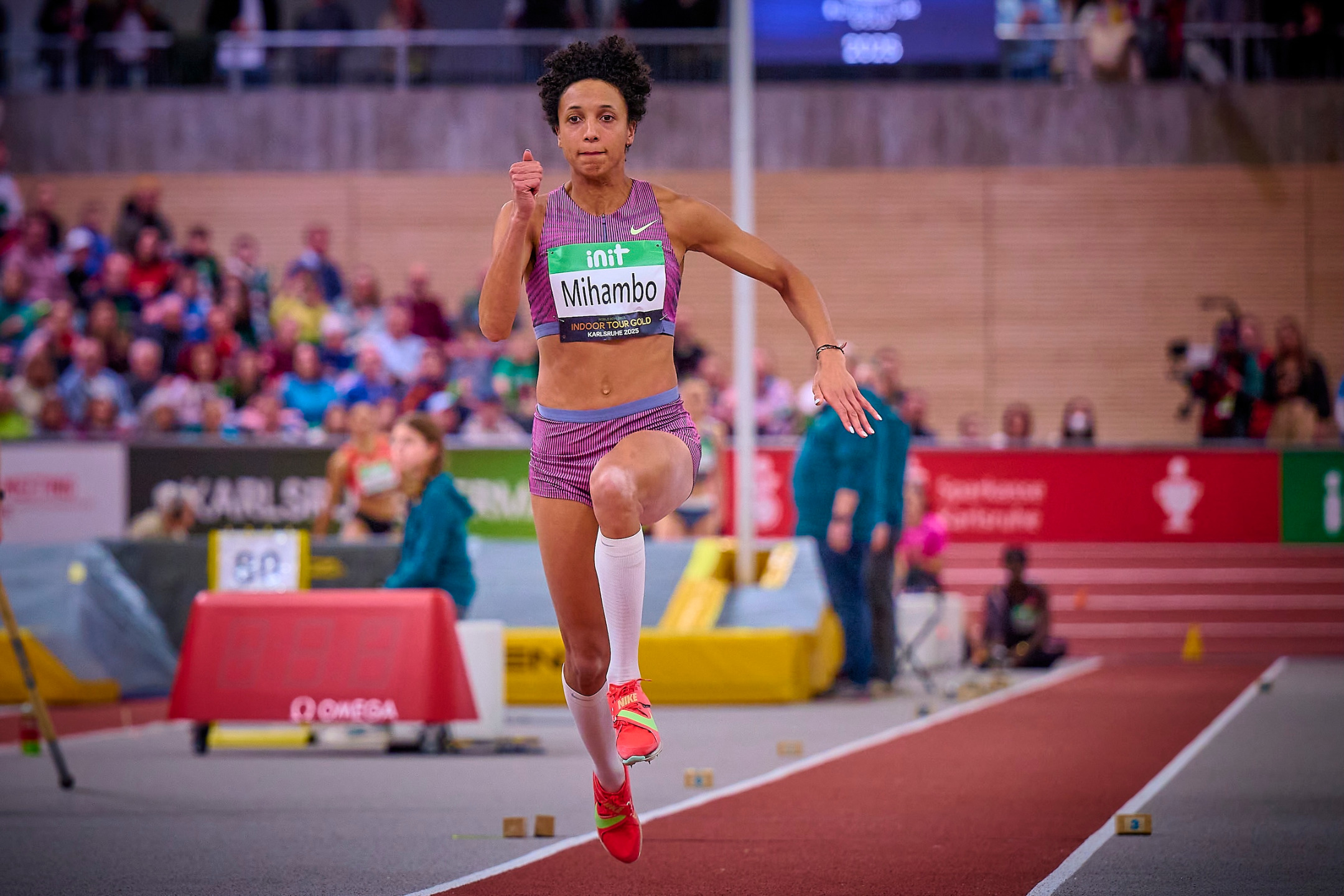
As part of the World Athletics Indoor Tour
Is it all about Heike?
Karlsruhe has been home to Heike Drechsler for many years now, and listing all her achievements would probably take more than a sheet of paper. Suffice it to say: five Olympic medals, including two gold medals for two Olympic victories in the long jump (1992 Barcelona and 2000 Sydney), two outdoor world championship titles, also in the long jump (1983 and 1993), four consecutive outdoor titles at European Championships (1986, 1990, 1994 and 1998) in the long jump and one European Championship gold medal in the 200 metres (1986), along with two World Championship titles indoors (long jump and 200 metres) plus four European Championship titles indoors in the long jump. In addition, she has won countless German championship titles and, last but not least, has been the long jump winner at the INIT INDOOR MEETING four times (1993, 1994, 1995 and 2001). She is the most successful long jumper ever and remains closely associated with the INDOOR MEETING. But even in the recent past, athletics fans in Karlsruhe have been able to experience top athletes live in the hall. Leading the way is Olympic and world champion Malaika Mihambo, who was also named Germany's Sportswoman of the Year in 2019 and 2020 and is a welcome guest in Karlsruhe. In 2020, her jump of 6.83 metres earned her second place ahead of Ukraine's Maryna Bekh-Romanchuk, who secured the day's victory with 6.92 metres and ultimately also the overall victory in the World Indoor Tour. However, Mihambo stood at the top of the podium last year. An incredible 7.07 metres in her fourth attempt at the beginning of February not only meant victory on the day, but also equalled the 31-year-old meeting record of 7.06 metres – set, of course, by Heike Drechsler.
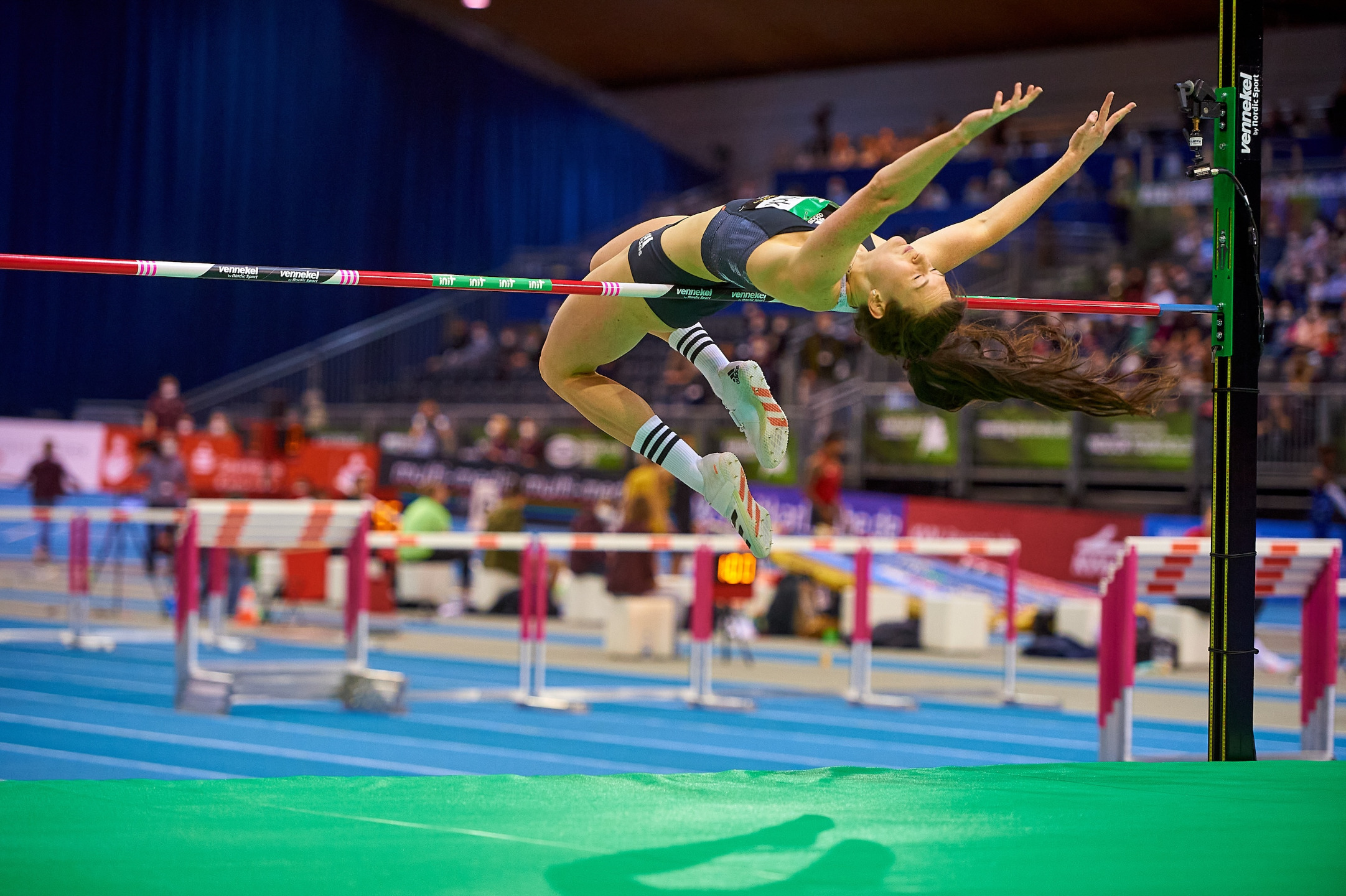
As part of the World Athletics Indoor Tour
Unforgettable high points
If you ask regular visitors to the meeting about their most thrilling experience at the INIT INDOOR MEETING Karlsruhe, you will often hear that it was the incredible high jump duel between Ariane Friedrich and Blanka Vlasic in 2009. Both women cleared the incredible height of 2.05 metres, which was a meeting record for both of them, but in the end the German triumphed over the Croatian due to the multiple attempts rule in a competition that thrilled the visitors. The women's high jump has a long tradition at the INIT INDOOR MEETING Karlsruhe, and it was big names who mastered great heights. For example, Heike Henkel, who won gold at the Olympic Games in Barcelona and already cleared 2.04 metres at the INIT INDOOR MEETING in 1992. Or Alina Astafei, who also cleared two metres (1995), and Blanka Vlasic and Ariane Friedrich, who fought an unforgettable battle in 2009. The bar was cleared above two metres – 2.02 metres, to be precise – in 2020 as well. On 31 January, Ukrainian Yaroslava Mahuchikh set a new national record and U20 world record, already hinting that her name would continue to dominate women's high jump in the future. Bronze at the 2020 Olympics, gold at the 2023 World Championships and European gold in 2022 and 2024 should confirm this. The last time the bar was cleared at the INIT INDOOR MEETING was in 2022, when there were even two winners. Emily Borthwick from Great Britain and Imke Onnen shared the day's victory with a jump of 1.91 metres.
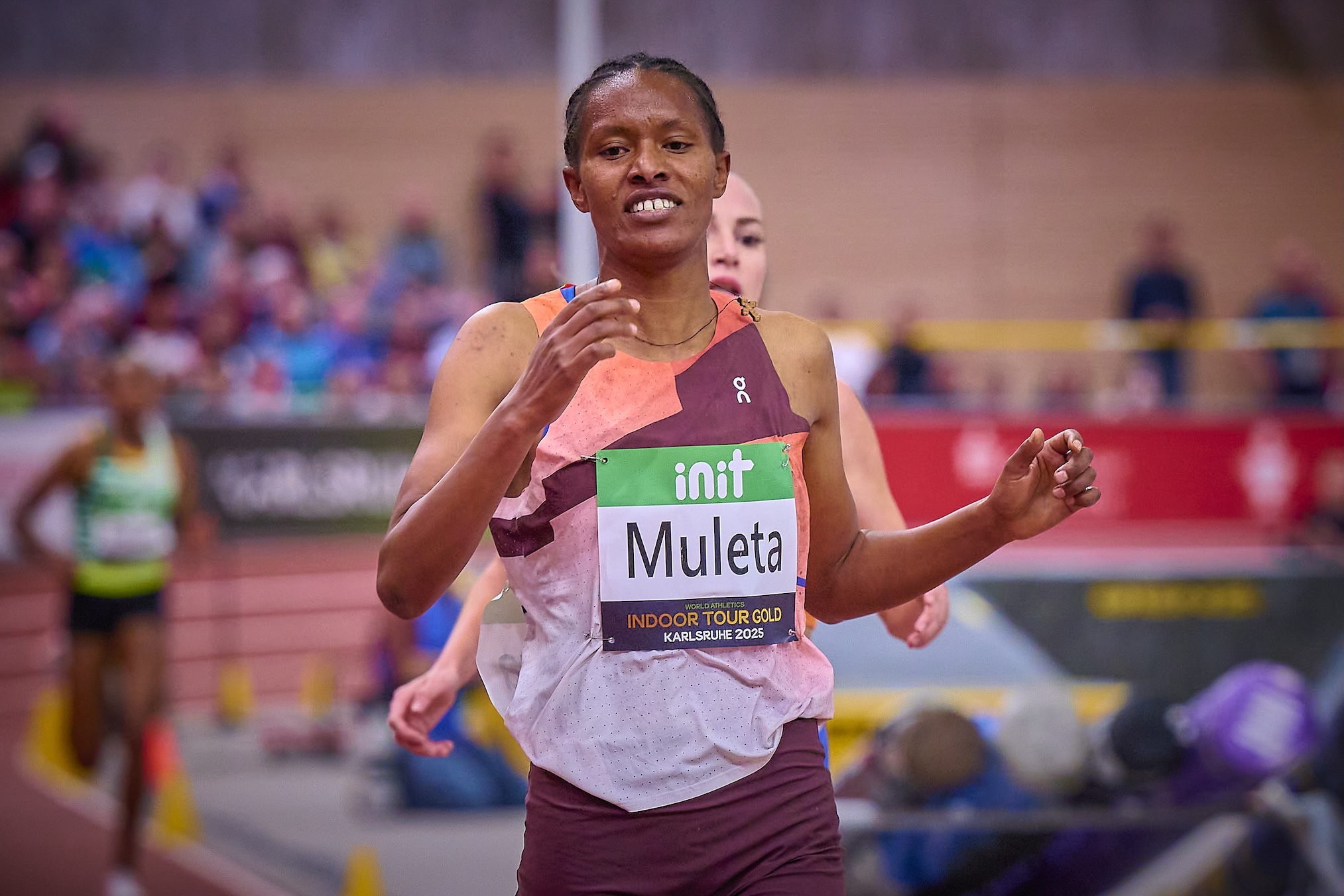
Additional discipline
Almost new, but already a cult favourite
It is the longest distance at the INIT INDOOR MEETING Karlsruhe: the women's 3,000 metres. This competition has only been part of the meeting programme since 2010, but it already caused great excitement among the athletics-mad Karlsruhe audience, who have always had a special relationship with the long distance. This is certainly due in part to the unforgettable races of Haile Gebrselassie in the men's event, but what the women have offered spectators since their first appearance in 2010 has been just as impressive. Since then, the 3,000 metres at the INIT INDOOR MEETING Karlsruhe has been one of the highlights of the programme. The women's 3,000 metres was last run last year. The clock stopped at 8:57.52 minutes when the runners crossed the finish line. This time was achieved by Ethiopian Muleta Lomi, who secured second place in the World Indoor Tour with her victory in Karlsruhe and a second place at the meeting in Madrid.
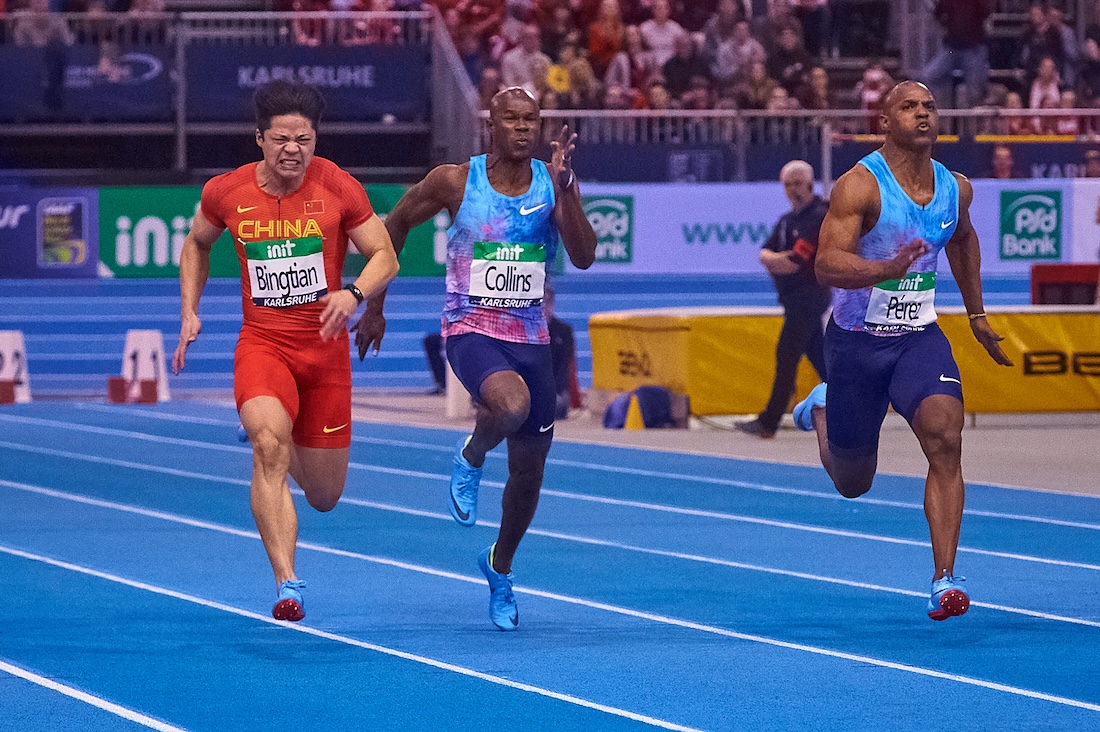
As part of the World Athletics Indoor Tour
Reaction time is everything
In just under six and a half seconds, it's all over when it comes to the shortest indoor distance. This shows how important a good start is in the 60 metres and how fine the line is between a top reaction and a false start. In the history of the INIT INDOOR MEETING, it was a Frenchman who found the best balance in terms of reaction time. In 2005, Ronald Pognon clocked 6.45 seconds in the 60 metres, which was a European record at the time and was only improved four years later in Turin by Britain's Dwaine Chambers with a time of 6.42 seconds. There has only been one German winner in the history of the meeting. In 1999, it was Marc Blume from TV Wattenscheid who won the short sprint in 6.54 seconds. In recent years, the 60 metres has rarely been included in the meeting programme. Jamaican Lerone Clarke won in 2011 – back then still in the Europahalle. In 2016, at the new edition in the exhibition hall, American Mike Rodgers secured victory in a time of 6.52 seconds ahead of Kim Collins from St. Kitts and Nevis. Chinese athlete Su Bingtian sprinted even faster in 2018, setting an Asian record time of 6.47 seconds on the tartan track.
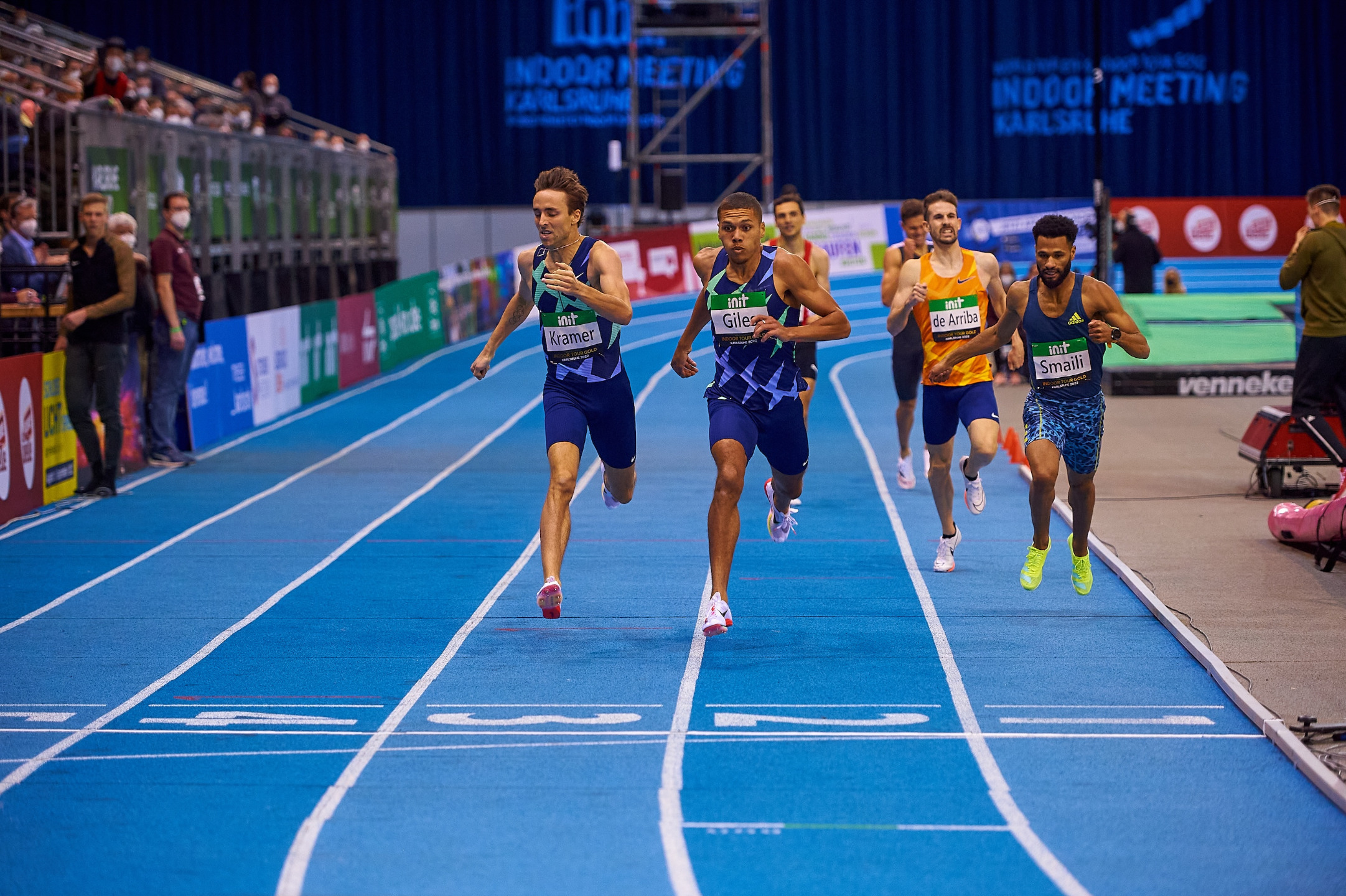
As part of the World Athletics Indoor Tour
An unprecedented moment
It has been a good 25 years since a young athlete from Russia turned the athletics world in Karlsruhe upside down in the 800 metres, because no one had ever seen such an unorthodox approach to this middle-distance race as Yuriy Borzakovskiy's. Visitors to the INIT INDOOR MEETING in 2001 could not believe their eyes when the then 19-year-old trailed his opponents by a long way for two laps in the Europahalle and seemed to be hopelessly behind, but then fired up the turbo in the last two laps, which was to become his trademark. Borzakovskiy completely overturned the entire field from behind, ran his opponents into the ground and won in a time that had never been run before at the meeting and would never be achieved again. The clock showed 1:44.15 minutes when the young Russian stormed across the finish line. It was a meeting record – which still stands today – and marked the international birth of a middle-distance superstar who went on to celebrate Olympic gold in Athens in 2004. From 2016 to 2022, the 800 metres was a permanent fixture in the INIT INDOOR MEETING programme. The winners were Adam Kszczot, Erik Sowinski, Marcin Lewandowski, Andreas Kramer, Mostafa Smaili and Elliot Giles twice. It was Giles who came closest to Borzakovskiy's meeting record. In 2021, he ran the four laps of the stadium in 1:45.50 minutes.
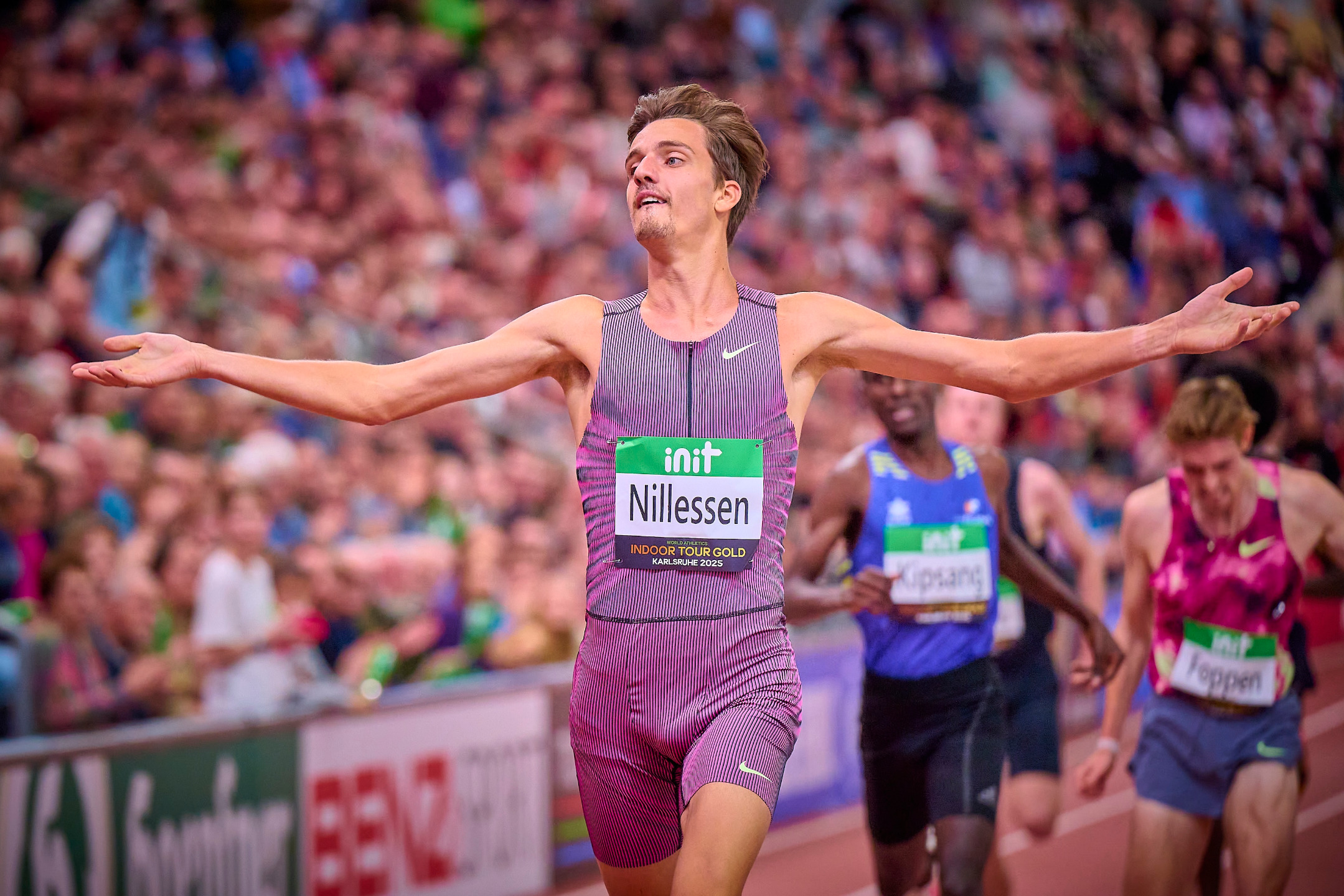
As part of the World Athletics Indoor Tour
Haile's world
"Over 5,500 people are stamping their feet and shouting at the top of their lungs, the drums are booming in a rhythm that everyone has to follow, a fresh breeze is blowing in from outside through the open roof, and it's not summer, nor are we in Rio at the carnival. It's January, it's cold outside, and it takes quite a bit of imagination to explain to someone who happens to be visiting the city why you have to open the roof of a hall. Trying to explain why the 5,500 people inside are making such an infernal noise is out of the question, but perhaps you could try giving them a name. A bit of a tongue twister, admittedly, but at least familiar to those who are involved in athletics and even more so to those who know that the greatest of all time is a small man from Ethiopia named Haile Gebrselassie." These lines begin a text that appeared in SONNTAG on 17 January 1999, referring to the top event at the 15th INIT INDOOR MEETING Karlsruhe. The 3,000 metres with Ethiopian running legend Haile Gebrselassie, who won this distance a total of five times in the Europahalle (1997, 1998, 1999, 2003 and 2004) and set a world record once. Of course, the 1998 time of 7:26.15 minutes set by the two-time Olympic 10,000-metre champion is still the meeting record, and the 3,000 metres is a cult distance, because Dieter Baumann, who won this distance twice, also set a European record here in 1995 at the meeting with a time of 7:37.51 minutes. A time that is still the German indoor record. The atmosphere in Karlsruhe is always electric at every edition of the 3,000 metres. This was also the case in the new arena, where the middle-distance discipline was held in 2015, 2016, 2018, 2020 and 2022. In 2021, when the event returned to the Europahalle due to the pandemic, Kenyan Bethwell Birgen won with a personal best of 7:34.12 minutes, as he did in 2020. In 2022, the middle-distance runners competed again in the athletics arena at the Karlsruhe Exhibition Centre. There, Ethiopian Berihu Aregawi won in 7:26.20 minutes. In the most recent edition of this discipline at the INDOOR MEETING and the return to the Europahalle ‘living room’, it was Dutchman Stefan Nillessen who won the fifteen laps of the stadium in 2025 in 7:37.10 minutes, a personal best and national record.
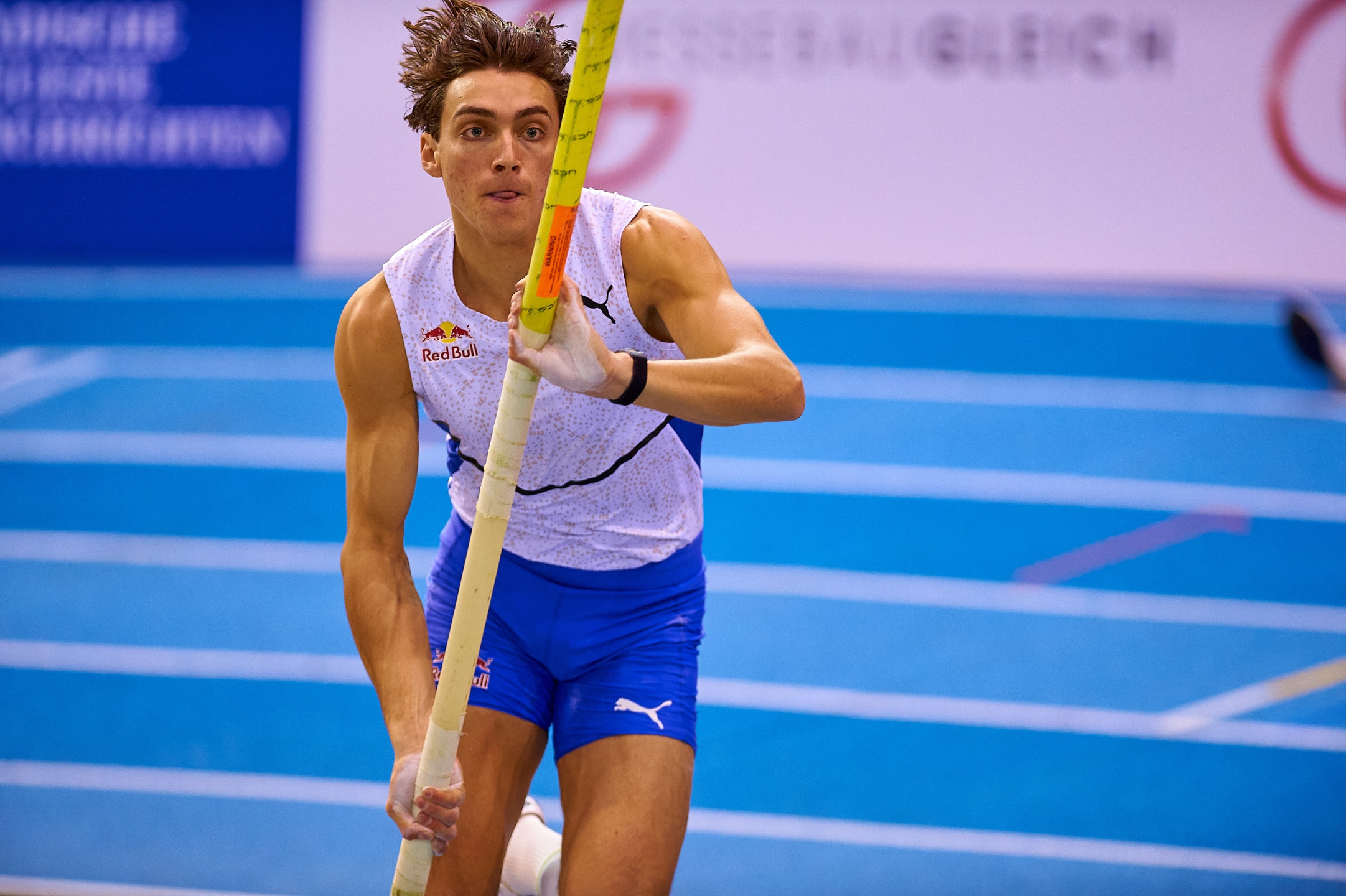
As part of the World Athletics Indoor Tour
In Lobinger's living room
When someone has won the same event seven times, they can certainly refer to the venue as their ‘living room’. Tim Lobinger, who sadly passed away far too early in 2023 at the age of just 50, achieved the feat of winning the pole vault competition at the INIT INDOOR MEETING in the Europahalle seven times in eleven years. On 14 February 1997, he stood at the top of the podium for the first time. His last meeting victory dates back to 10 February 2008. In between, he enjoyed successes in 1999, 2001, 2002, 2004 and 2005. However, one thing remained elusive for the man who, in 1997, became the first German pole vaulter to clear the magical six-metre mark outdoors: the meeting record. For many years, this was held by Sergey Bubka with 5.80 metres, which he cleared in his victory in 1991. A record that was equalled by Michael Stolle in 1998, but which was only surpassed in 2013 by the French Olympic champion at the London Games, Renaud Lavillenie, with 5.83 metres. He also equalled his own meeting record in 2015 (5.86 metres), 2016 (5.91 metres) and finally in 2021 (5.95 metres). Until finally, high flyer Armand Duplantis found his way to Karlsruhe in 2022. On 28 January 2022, the previously unattained 6-metre mark was broken at the INIT INDOOR MEETING. The Swedish superstar cleared 6.02 metres in the end. We are excited to see if this height can be surpassed again in Karlsruhe.
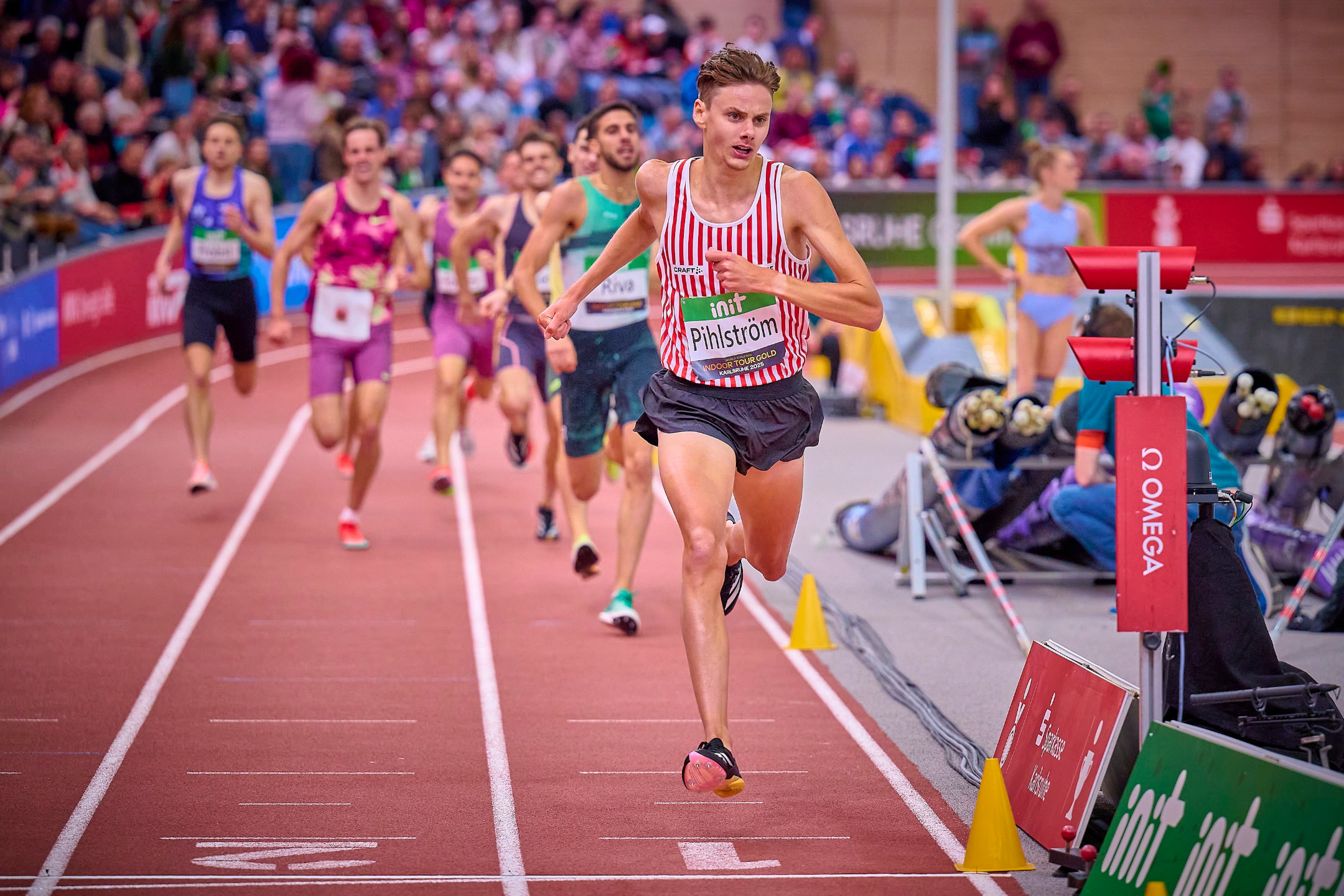
As part of the World Athletics Indoor Tour
Baala's French home game
For almost a decade, Mehdi Baala was something of a regular guest at the INDOOR MEETING. The man from nearby Strasbourg also trained regularly at the Europahalle, so his appearances almost became a home game – whether in the 800 metres, the 1000 metres or the 1500 metres, which he won three times. After finishing second in his first start in 2000, he went on to win in each of the following two years. He celebrated his greatest success exactly nine years after his debut. In 2009, he stormed to victory in the 1500 metres at the meeting for the third time, finishing in 3:34.71 minutes. At the time, this was not only the best European performance of the year, but also a new French indoor record. He was twice European outdoor champion (in Munich in 2002 and Gothenburg in 2006), won the silver medal at the 2003 World Championships in Paris and was subsequently awarded the bronze medal at the Olympic Games in Beijing because the original winner, Rashid Ramzi, was found guilty of doping. Since 2010, the 1,500-metre middle distance has been dominated by Kenyan athletes, with seven of the nine races since then won by athletes from Kenya: Gideon Gathimba, Bethwel Birgen (three times), Nixon Chepseba, Silas Kiplagat and Vincent Kibet. Incidentally, the current meeting record is also held by a Kenyan. In 2005, Daniel Kipchirchir Komen crossed the finish line in a time of 3:33.08 minutes, which remains unmatched to this day. Even Sweden's Samuel Pihlström, who ran the 1,500 metres in 3:35.62 minutes last year, was unable to match this time.
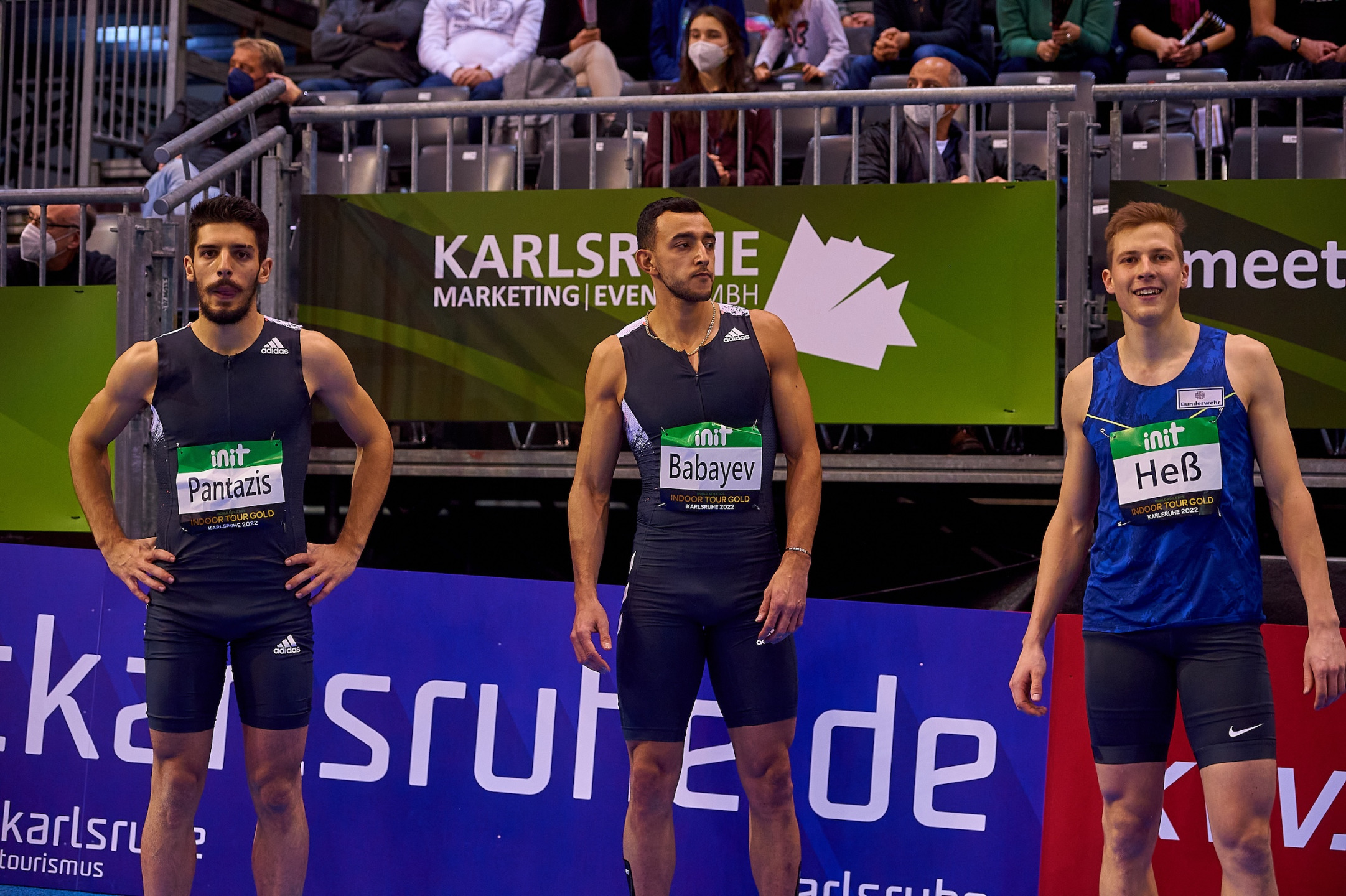
Additional discipline
‘Hop’, “step” and ‘jump’
Technically speaking, the triple jump is probably one of the most demanding disciplines in athletics, because getting the ‘hop’, “step” and ‘jump’ right is anything but easy. But when they do, the best male athletes can fly over 18 metres. In the early 2000s, the men's triple jump was a regular feature of the INDOOR MEETING, before having to wait seven years for its return from 2009 to 2016. The last edition was won by Cuban Alexis Copello with a jump of 16.99 metres. The Brazilian Jadel Gregorio continued the tradition in 2004. He still holds the INDOOR MEETING Karlsruhe record with his jump of 17.46 metres. However, it has been a while since the last edition of the men's triple jump at the INIT INDOOR MEETING Karlsruhe. In 2022, back then in the exhibition hall, Greece's Andreas Pantazis secured the day's victory with a jump of 16.79 metres.


